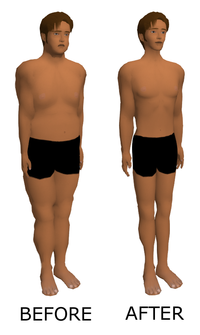
Photo from wikipedia
Purpose of ReviewSome personality traits seem to be associated with obesity, but there is little information available regarding their association with obesity treatment outcomes. The aim of this systematic review… Click to show full abstract
Purpose of ReviewSome personality traits seem to be associated with obesity, but there is little information available regarding their association with obesity treatment outcomes. The aim of this systematic review was therefore to assess the associations between personality traits—evaluated by means of the Temperament and Character Inventory (TCI)—and outcomes of obesity treatment, including attrition, weight loss, and weight loss maintenance. The PubMed database was searched, and studies were screened as per the Preferred Reporting Items for Systematic Review and Meta-Analyses (PRISMA) guidelines, and data were collated using a narrative approach.Recent FindingsOf the 886 articles retrieved, 9 studies assessing personality traits by means of the TCI in participants with obesity met the inclusion criteria and were reviewed. This approach revealed three main findings: (i) only one study found that attrition rate—during a 6-month behavioral weight loss program—is predicted by low reward dependence scores at baseline; (ii) two studies found that lower novelty-seeking and higher self-directedness scores at baseline positively predict short-term weight-loss magnitude; and (iii) four studies found that higher persistence and lower novelty-seeking scores at baseline predicted weight maintenance at 12 and 24 months.SummaryNovelty-seeking and self-directedness traits appear to be predictors of short-term weight loss (≤ 6 months), and persistence and novelty-seeking traits may be related to long-term weight loss maintenance (≥ 12 months), although great uncertainty still exists regarding predictors of attrition.
Journal Title: Current Obesity Reports
Year Published: 2018
Link to full text (if available)
Share on Social Media: Sign Up to like & get
recommendations!